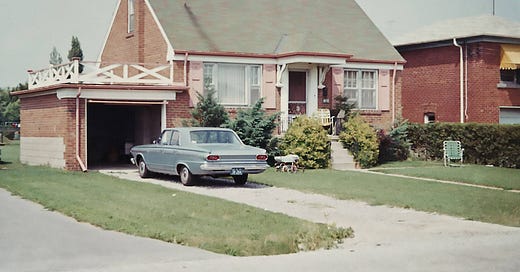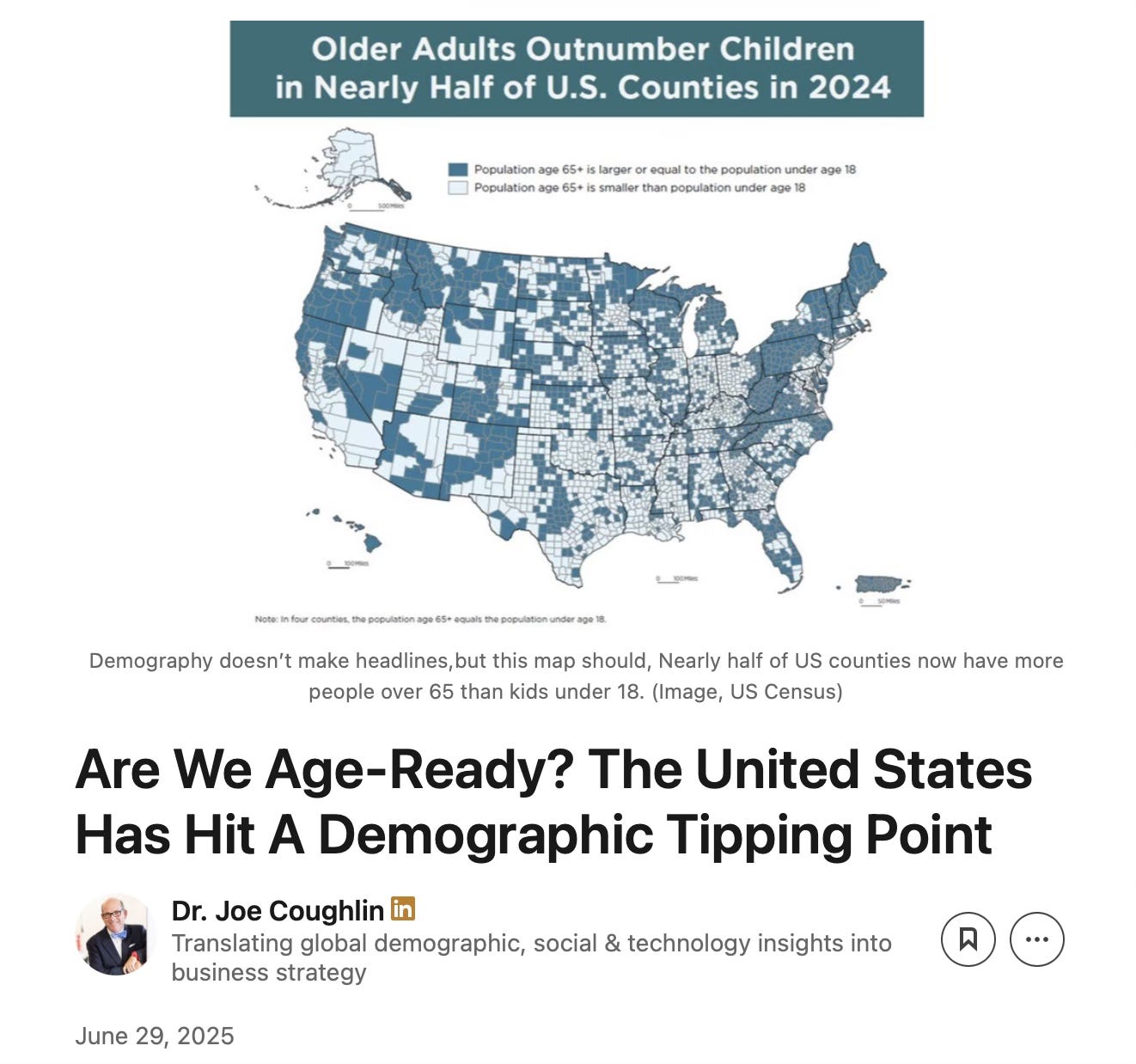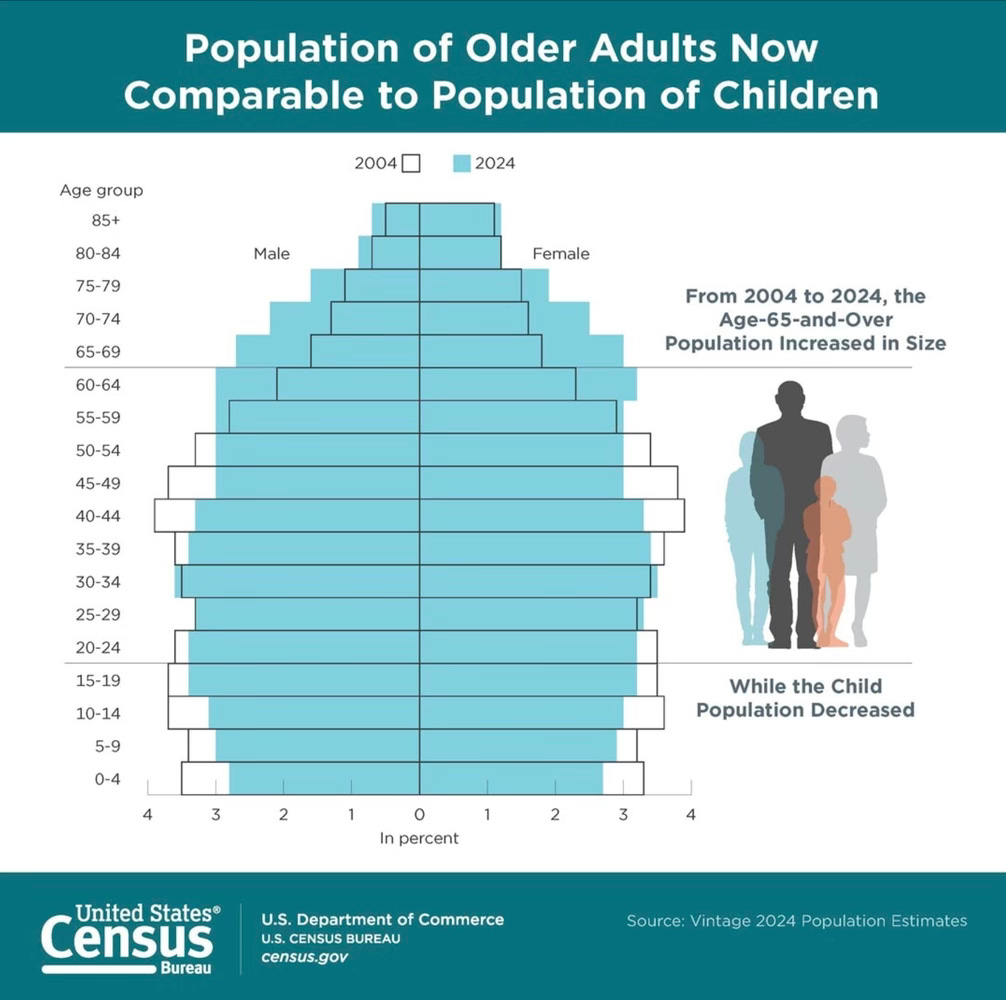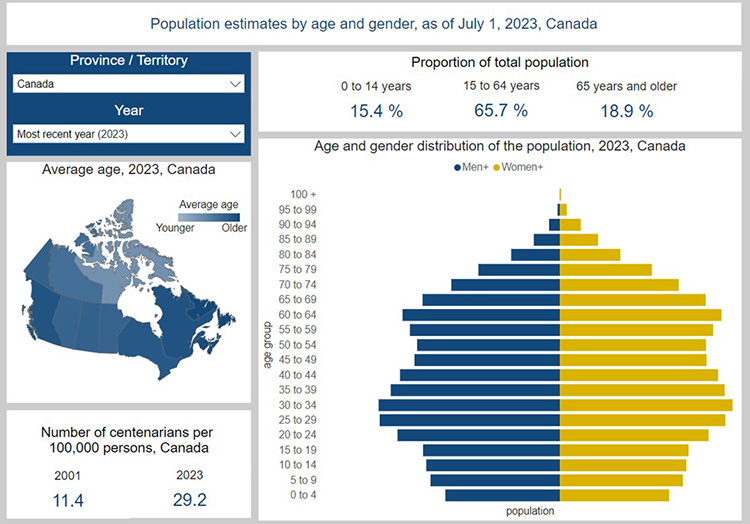The demographic time bomb is about to detonate
Attention must be paid: there are now more old people than young.
My last post, in which I complained that Toronto just blew it with its rejection of sixplexes in the suburbs, was illustrated with a photo of my late mother-in-law’s house. It had a bathroom on the second floor, a powder room at the entry, but no bathroom on the mid-level with the living, dining, and kitchen. When the stairs became painfully difficult, she had to decide whether to stay upstairs with the bathroom or go down half a flight to eat. My wife had been trying to get her to sell and move into an apartment for years, but she wanted to stay in her neighbourhood.
She is not alone; many of those suburban houses are occupied by aging baby boomers who want to stay in their neighbourhood, but there are no fourplexes and sixplexes or any options other than an expensive retirement home. There are no small ground-floor apartments that they could move down the street to. All these homeowners who fought these zoning changes are going to be wondering in ten years, “gee, I wish there was a small rental building in the neighbourhood.”
But this is just one chapter in a much larger story. I have been writing about this for years, predicting the coming crises caused by aging baby boomers like me, the demographic time bomb causing crises in housing, transportation, health care, urban design, and even climate. Oh, and there was the crisis of governance,
…with baby boomers voting to elect conservative and populist governments who promise to keep things the way they are, who won’t do anything about climate change, who won’t raise the taxes needed to fix what we have, let alone plan for the future. We have baby boomers who fight every bike lane or transit line because it might slow down their driving or remove their parking. Who don’t think about how they will get around when they are old-old and can’t drive anymore. Who don’t think about who will care for them when all the drawbridges are pulled up.
I talked about this as if it were some time in the future, when the baby boomers got old. But Dr. Joe Coughlin suggests that we have hit the demographic tipping point. Usually, everyone ignores demographics, but as Coughlin notes,
“Unlike breaking news events, which punctuate our days with near-constant urgency, demography is a constant backdrop. It’s slow, unglamorous, and ubiquitous. It quietly shapes everything: our politics and our economy, our schools and hospitals, our labor markets and housing systems. Like tectonic plates, demographic forces shift slowly beneath our feet, while profoundly redefining everything above.”
The US Census Bureau reports that “Nearly half of all counties across the country are now home to more adults 65 and older than kids under the age of 18. This is not just a statistical footnote. This is a turning point that will be felt in every industry, every institution, and every community across the country.”
This is not just a problem in the USA; I thought Canadians were generally younger than Americans, but they are a bit older; there are significantly more Canadians over 65 than under 14. We will face the same problems that Coughlin lists:
Who will do the work? “Businesses can no longer assume a steady pipeline of young workers. The war for talent will be fought not just with higher pay, but also with flexibility, automation, and incentives to keep older adults on the job.”
Who is going to take care of us? “An older population will present more chronic conditions, more caregiving needs, and higher long-term care costs.” As the population ages, we face two health care crises: Are there enough doctors, nurses, and facilities, and how are we going to pay for it all?
Community infrastructure: Coughlin lists increasing demand for “increasing demands to support an aging population, including transportation, housing, home services, community hospitals, and next-generation senior centers.”
In my earlier post on this subject, I did my similar list of problems and crises:
There is a transportation crisis, where we won’t be able to cope with the number of people who can’t drive. Currently seniors transportation services can cost as much as fifty bucks a ride; Imagine when untold millions are trying to get around.
There will be a health care crisis, because older people account for half of health care spending now, and the proportion will continue to grow.
There will be an urban design crisis, where sidewalks are too narrow to accommodate the numbers of older pedestrians, the mobility devices, the walkers, where every intersection will turn into a death zone.
I have been beating my head against the wall about the demographic time bomb for fifteen years, but even when I had bigger platforms, nobody really paid attention. Coughlin explains why:
“Demographic change doesn’t demand attention—until it does. No sirens are blaring when a state shifts from “young” to “old.” There’s no countdown clock warning us when our communities will have more retirees than schoolchildren. And yet, these changes influence nearly every budget, every plan, every decision we make as a society.”
It’s hard these days to pay attention to demographics when the day-to-day politics are so crazy, and I am not going to get into the weeds about the US government picking the people who might take care of its citizens off the street or the impact of the current bill going through Congress. I have my own issues at home in Canada, at the local level with zoning, the provincial level with health care, and the federal level with the economy being tanked by tariffs.
But Dr. Joe Coughlin is correct, and despite all the noise, demographics are about to seriously demand our attention.
Previously on this subject, if I have your attention:
Another survey confirms that boomers are clueless. They apparently think that they can drive to their suburban single family house forever.
The coming crises caused by aging baby boomers like me. Count'em; there's housing, transportation, health care, urban design, and even climate.
We're facing a demographic time bomb. We've got about five years to help communities prepare. Will we?
How can an aging population shape our cities? A twelve year old study from the RIBA holds up extremely well.
Baby boomers will be among the hardest hit by climate change. And no, they won’t all be dead before its effects hit us all hard.
Why fighting small apartment buildings is self-defeating and short-sighted. People may not want neighbourhood change, but they can't avoid their own needs changing.
Special offer!
I do not want to put up a paywall on this site, but it provides a meaningful portion of my income. So here’s a limited-time offer: I will send a signed copy of the print edition of “Living the 1.5 Lifestyle” to anyone in the USA or Canada who signs up for a one-year subscription (C$50, cheap at about US$35 ).








I am a leading edge Boomer, born in 1946, now 79.
I faced the lack of preparation in the school system where I grew up in Western Canada.
In Grade Three we had a huge influx of students from a nearby new subdivision. I went to school from 7:00 AM to 1:00 PM and the second class went to school from 1:30 PM to 7:30 PM. With the same teacher !!
My next school out in what was the “suburbs” of our small city. We had only one Grade Four class that had 60 ( yes SIXTY ) students with only one teacher, with no educational assistants. We had an extra row of desks, and the desks were within three feet of the front blackboard and within four feet of the lockers at the back. I consider my Grade Four teacher as one of my heroes of my education.
By the next year they doubled the size of the school. In Grade Ten my high school was hit by all the students coming from another new subdivision that did not have a high school yet.
At University it was the same.
Demographics is a science yet politicians refuse to acknowledge the hard facts of what is coming and we in North America will suffer from this deliberate ignorance. Most boomers are looking in the rear view mirror ignoring the bumpy road ahead for them and their children.
In the 70’s I worked in the Office of Energy Conservation in my province. I learned about the coming threat of climate change. We were on the leading edge of energy efficient housing.
But we did not study the social impacts of aging combined with climate change and auto dependent suburbs.
We are now like Wylie E Coyote holding a stick of dynamite with a very short fuse.
As sure as the sun rises, there was always going to come a time of flat or declining population. Anything that can't go on forever.. So, the pearl clutching is because it's now, not later? Why would later be better?